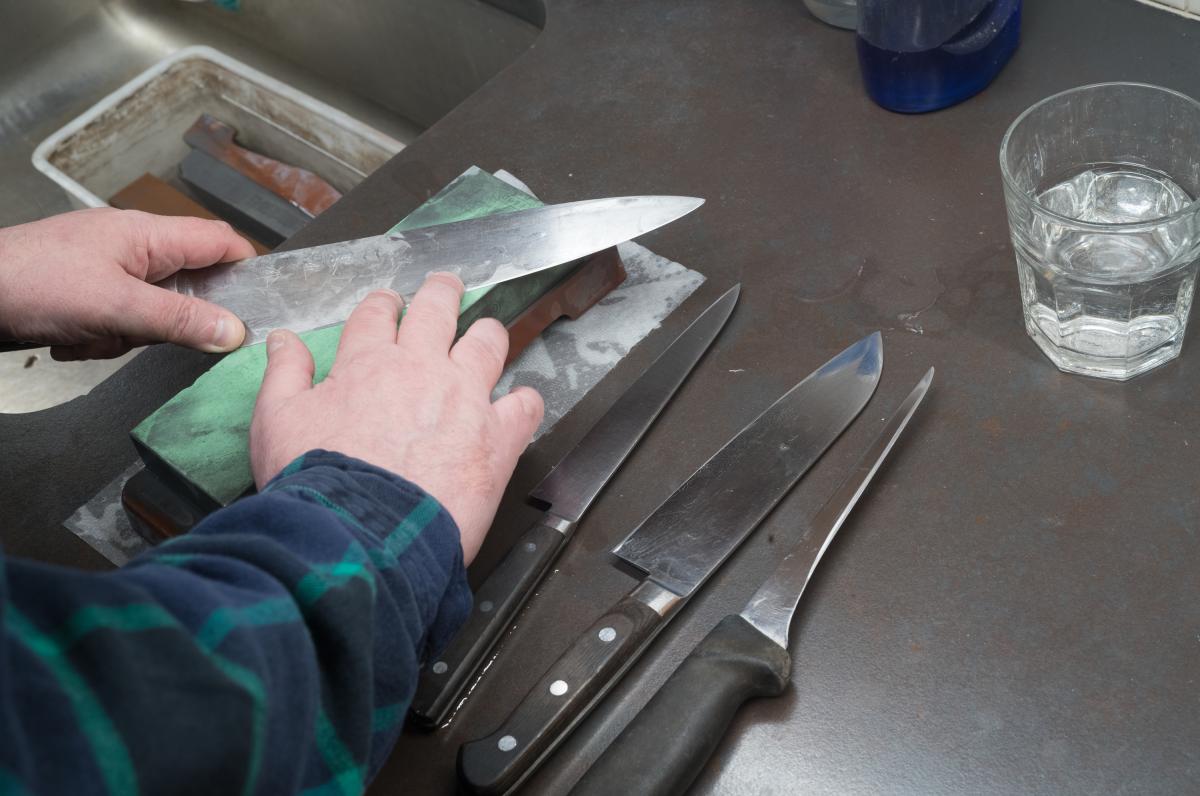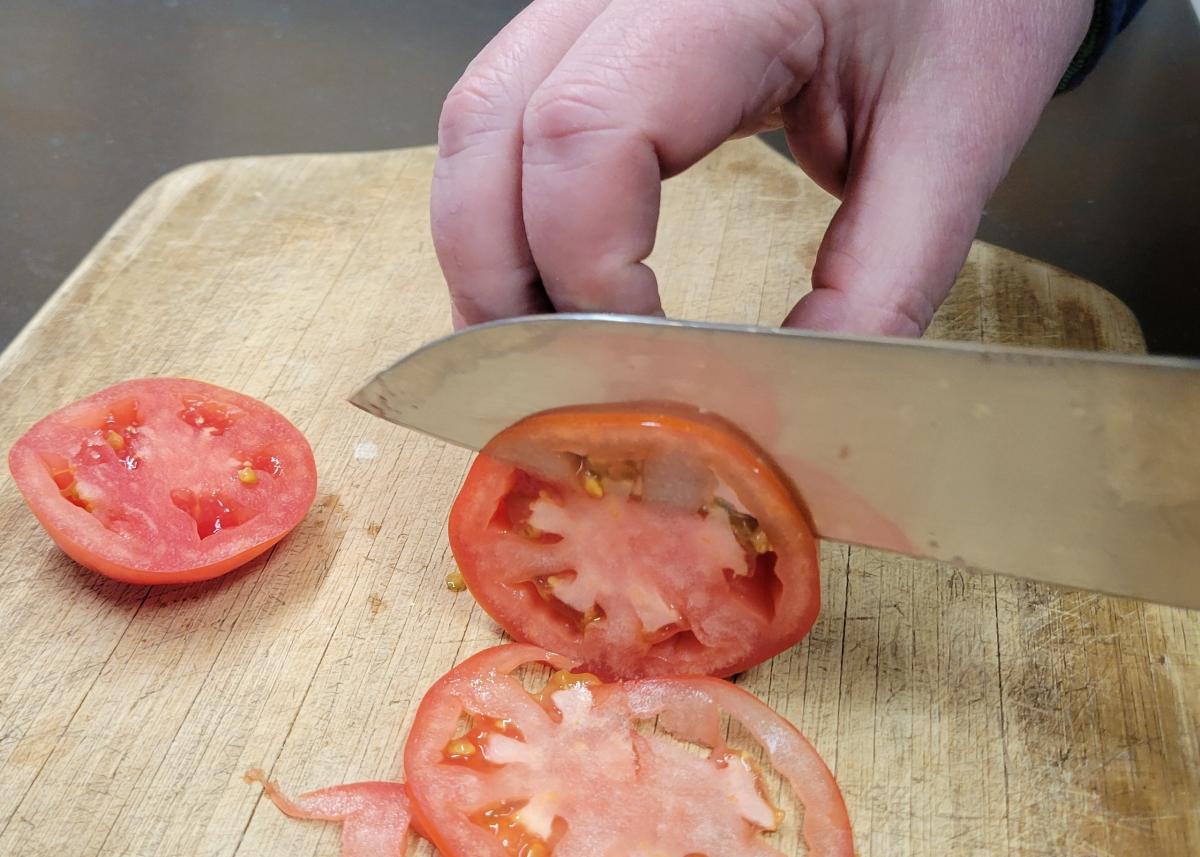
An occupational / avocational hazard many of us have faced as woodworkers: a request to make a piece of furniture. It might be for a significant birthday present; it might be for payment (or not). “It’s just a stool” (or picture frame, or jewelry box, or bench - to be fair, it typically isn’t a Queen Anne Highboy. In other words, it’s a reasonable “ask” - except it’s sometimes hard to make the time and space and effort to make it.
There are many factors driving the interest in spoon carving, but surely the relative speed, space demands, material demands, skill demands, etc. of making a spoon versus making a piece of furniture helps promote spoon-making. The joys of creation and the joys of gifting meet the joy of (relatively) immediate gratification!
But if you don’t want to make a spoon, or if your intended recipient doesn’t need or want your spoon, you can give another gift that uses your hard-won skills: knife sharpening.
A friend who took a cooking class brought her newly-sharpened chef’s knife (her knife; my gift of sharpening) to class. She immediately got a gold star from her teacher. “A woodworker did this! They really know what sharp means!” The teacher then devoted 10 unscripted minutes of the class to talk about sharpening and its importance in making culinary prep easier.
If you have chisels and plane blades, I hope you have learned to sharpen them. What about your kitchen knives? They work best when sharp too!
It's beyond the scope of this blog entry to go through all the lessons and things you need to know to specifically sharpen knives. But basically it's exactly the same skill you would use in sharpening your other blades. But - even better - kitchen knives are typically cutting softer material than wood and therefore they don't need to be as sharp as woodworking tools.
In woodworking we aim for that glass smooth edge. The smoother the edge, the fewer scratches, the longer the edge will last. That's because wood offers a fair amount of resistance to cutting, which stresses the blades. With cutting food, on the other hand, you can actually get away with a fairly coarse edge. A sawtooth can slice away at a piece of meat even when it isn’t super sharp. You can get a lot of use out of a second- rate serrated knife. You even see serrated knives recommended for delicate cutting tasks such as cutting a tomato because a dull serrated knife will do a much better job getting past the tomato’s skin than a dull chef’s knife does. But on a delicate piece of fish the sawtooth will grab and tear. Kitchen knives also can quickly get dull because they get pushed against cutting boards, which is bad for the edge. (BTW plastic cutting boards are just deadly against a sharp edge.)
As is true with saws, even poorly sharpened knives will cut better than dull knives.
In the pictures I am sharpening several kitchen knives. The series of stones I am using are 400 grit (to bring up a wire edge); 1200 grit (to start chasing the edge); and 5000 grit (to finish and polish the edge). I then strop with newspaper. Why do I use that sequence of stones? In the shop I would use diamond stones; here I am using some older waterstones that I don’t use for woodworking anymore - so I might as well use them in the kitchen. Although diamond stones are faster, everything works. When I am feeling lazy I skip the 5000 grit, but I find I get a better result at 5K. I used to add a 10K grit stone, but that seemed like overkill - an impressive edge, but it didn’t last.
Sharp tools, whether sharp kitchen knives or sharp chisels, not only make the work easier, it opens new possibilities in doing the work. Imagine the difference using a sharp knife that doesn’t slip and cuts where you intend to cut. Such a tool makes any cook appear more skillful and inspires more complex and potentially rewarding work.
I began this blog entry describing sharpening as a skill that you could offer to others because most of the users of kitchen knives have no idea how to sharpen them. Most of the advice I have seen on-line on newspaper cooking sections or mass market cooking sites is actively bad. But to be fair, the writers of these articles seem to not know what "sharp" actually means, or in the alternative, they do not regard sharpening skills in the same way they regard cooking skills: while they will spend decades learning to cook an omelet in a reliably excellent way, they think mastering a basic mechanical non-cooking skill is either beyond them or not worth learning how to do consistently. The standard advice seems to center on using honing steel or some gadget that shaves metal off, or something electric that holds the blade at a special angle. The main problem with honing steels is that they don’t remove metal so much as push it around. Over time the bevel will become steeper and therefore less able to do its work. Hand gadgets that shave metal off work, but not without effort and care. Electric knife sharpeners, at least the good ones, work better, but they do take off more metal and do not get to nearly the same level of polish you can get to by hand. Depending on the machine, the knife may also end up with a more fragile edge.
But the most satisfying aspect of knife sharpening by hand may not be the end result, but rather the wonder of using your unusual skills to do something nice for someone else. Even if you can’t present someone with a custom bookshelf, you can still use your talents as a woodworker to give them a useful and appreciated gift.

|
 Joel's Blog
Joel's Blog Built-It Blog
Built-It Blog Video Roundup
Video Roundup Classes & Events
Classes & Events Work Magazine
Work Magazine
























Cheers,
Michael
Good question! I just started writing a blog on the technique. "Kitchen knife sharpening for woodworkers. "
One thing to recognize is that different steels benefit from different finishes - I use a higher grit polish on my carbon steel knives than I do on "stainless".
I agree with you. The video isn't bad. I do however find it a lot fussier than works for me. I studied under a Master Japanese Knife sharpener and his methodology is far more straightforward. But everything works. Incidentally instead of using a fancy stone holder to keep the stone from moving about he used a wet kitchen towel. I use a paper towel. Works fine.